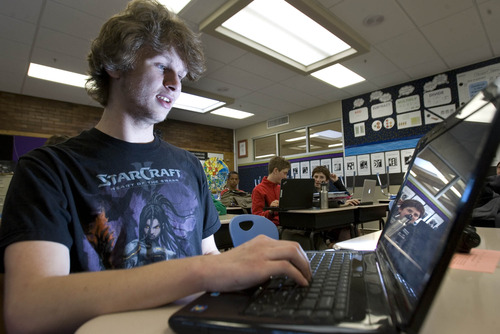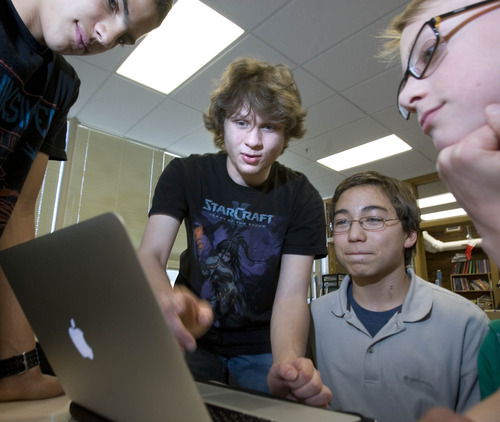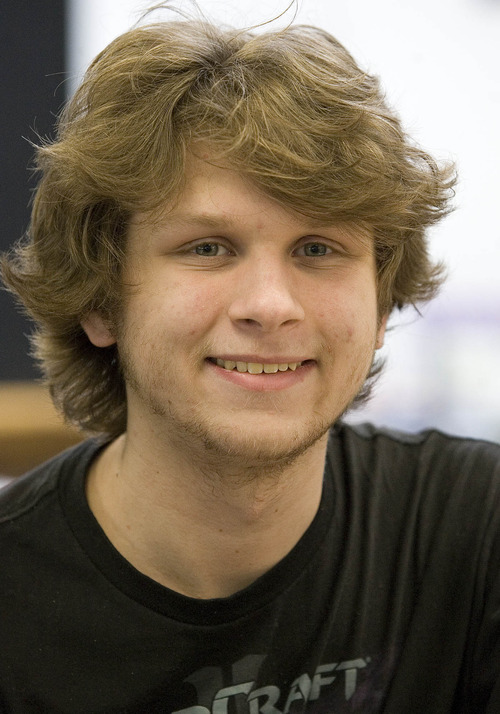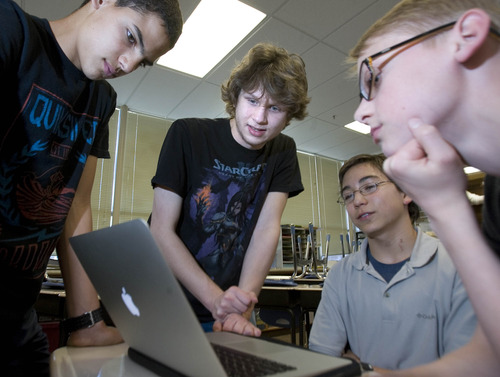This is an archived article that was published on sltrib.com in 2013, and information in the article may be outdated. It is provided only for personal research purposes and may not be reprinted.
As thousands of Utah high school seniors march across stages to graduate in coming days, they'll dream of summer, sun and STEM.
Or at least Utah leaders hope they'll think about STEM, an acronym for science, technology, engineering and mathematics.
Leaders in Utah and nationwide have been pushing for more education in STEM, saying that's where the jobs openings lie and what the economy demands. Some believe more Utah students would pursue STEM fields if they knew about the great demand for such graduates and how much money they could make.
And they say getting more kids interested in STEM earlier is key to increasing the number of Utah students going into those careers later.
To informally test those theories, The Salt Lake Tribune interviewed a handful of bright Utah high school seniors about their plans for the future.
In most cases they made their decisions based on exposure to and interest in STEM fields. High salaries and market demand for STEM graduates played a much smaller role.
Christian Seipp, senior at Salt Lake Center for Science Education in Salt Lake City
He placed among the top five winners at the Salt Lake Valley Science and Engineering Fair last year.
He runs a computational mathematics club after school.
And the 18-year-old helps out in a statistics class at his school, the Salt Lake Center for Science Education.
But Christian Seipp said he's not, by any means, a perfect student, "I enjoy learning and that's, I think, my biggest strength."
It's that passion for absorbing knowledge, especially in math and science, that's led him to ambitions of going into applied statistics. He hopes to earn degrees at Kettering University in Michigan in applied mathematics and computer science.
"The end goal is to hopefully be in a position to work with large amounts of data," Seipp said. "I think it's just really cool when somebody hands you all these observations, just all these data points ... there are so many cool stories you can tell about that data."
Though his dad is a biochemist, he didn't discover his interest in data until a 10th-grade statistics class. Before then he had considered becoming a professional flute player. His interest in data only grew when he began volunteering for HawkWatch International, working with statistics.
He said attending a school focused on science has also kept him motivated.
"When you have really good science teachers, it's really easy to learn about the things you're really interested in," he said.
Seipp said cash alone is not enough to motivate most kids to go into STEM.
"If you want to get more kids interested in it you can't just be like, 'You're going to make a lot of money doing this,' " Seipp said. "...You have to get kids interested in it. ... A happy life is more than just money."
Jared Sampson, senior at Mountain View High School in Orem
Although he got "an easy 5" — the highest score — on his Advanced Placement calculus test, and also took two years of physics, Jared Sampson said his first love is music.
The Mountain View High School senior plans to study his passion at Brigham Young University.
That's after he returns from his LDS Church mission in Cape Verde, a group of islands off the western coast of Africa.
"The biggest thing that I learned from these [science and math] classes is problem-solving and critical thinking," said Sampson, 18. "Although I probably won't use all the equations I learned in physics on a daily basis, I look at the world differently."
The teen said he has always gravitated toward math and science; his father, Scott Sampson, is a BYU business professor.
But he's also taken piano lessons since an early age, has been playing in bands and learning various instruments — tuba, percussion, base, trombone, flute and ukulele — and adding others soon.
"Music has the ability to influence people in many different manners and involves creativity and imagination while still living in a world of sound waves and harmonic series and other worldly laws," he said. "It's great."
With a 3.8 grade-point average, he plans on majoring in music at BYU, drumming in the marching band and playing in musical groups. He's unsure where he'll end up in music, admitting he could have a stable job teaching or something less secure performing.
"My dad supports me in whatever I do, but he expects both me and my brother (who also is studying music) will change our majors," Sampson said with a slight laugh. "Right now, I am a music major, but I might end up combining music and psychology to help people. I love composing."
Rebecca Nickerson, senior at West High School in Salt Lake City
Rebecca Nickerson has worked hard to be in an enviable position as a soon-to-be West High School graduate: She has her pick of prestigious universities, including the Massachusetts Institute of Technology and the University of Chicago.
But in the end, she decided on Yale University.
"I really like art as well," Nickerson said. "(At MIT) everybody is brilliant and focused on math and science ... but I liked Yale's humanities program."
Still, she plans to study science and math, specifically computer science and cognitive science, so that she can delve into artificial intelligence.
Nickerson has attended West High for six years, entering in the seventh grade in the Extended Learning Program — taking advanced classes — and then pursuing an International Baccalaureate (IB) degree.
"IB can be occasionally ridiculous," she said. "It has a lot of really strict and seemingly pointless rules for everything, but ultimately I think it does a good job of getting you to think about issues from multiple viewpoints."
During math competitions, which she began joining in elementary school, Nickerson was often the only girl. Now, "when I do math competitions, I'm one of the only girls to get to the higher levels," she said.
"It's not been an issue to be the only girl. The first time was very awkward ... but you really have to make people respect you."
Her grade-point average is 3.9. She also volunteers outside of school in addition to an internship at the math department of the University of Utah with Professor Ken Golden.
"I think getting better gender equality across STEM fields and other fields would be to stop assuming that one area of study is better than another, as well as to stop associating certain fields with particular types of people," Nickerson said. "Hopefully that would make it easier for any student to pursue whatever they are interested in, regardless of their gender."
Meghan Ricci, senior at Park City High School
Until last school year, Park City High senior Meghan Ricci thought she'd become a doctor like her mom.
But when she started thinking of her reasons for wanting to dive into medicine, she realized they weren't as solid as she thought. She's decent at science — scoring a 29 in the subject on the ACT — but not in love with it.
She is passionate, however, about storytelling and film. Her favorite childhood memories are of her parents reading to her aloud.
Ricci, 18, shifted her career goals to film industry producer or lawyer. She and several classmates won a second-place award in the Utah High School Film Festival this year, and Ricci plans to attend Seattle University in the fall as a pre-law student.
"I've always loved going to movies and watching how someone can create a story just from imagination or some experience in their life," Ricci said, "and I think it would be amazing to be part of that process."
Though film producing and film law can be lucrative careers, Ricci knows they can be tough to break into — unlike some STEM careers that are in high demand. But the competition she'll face trying to get a job in Hollywood isn't deterring her from her dream.
"I think you should do something you really want to do even if you have to overcome that fear that, yeah, it's competitive and almost impossible to get into," Ricci said. "You always hear people saying you need to do what you love or you're going to end up hating your life, which is kind of a drastic statement, but I figure I should follow that advice."
Among her friends, Ricci's the oddball, one of the only ones not planning to go into a STEM field.
Ricci said she believes most high school seniors understand that STEM fields promise more job security and cash than many other professions, but those factors alone are not enough to pull them in. She said kids have to be interested in those areas. —
Utah's high school Class of 2013
P Graduations at Utah high schools begin this week and continue into early June. More than 30,000 Utah seniors are expected to graduate.











